






























































130 North McDowell Street, Unit B, Charlotte, NC 28204 (704) 377-6221 • FAX(704) 377-4258
E-mail: service@bridgetowermedia.com • Circulation: 1-877-615-9536
Executive Vice President of Media and Senior Group Publisher
Liz Irwin, lirwin@bridgetowermedia.com
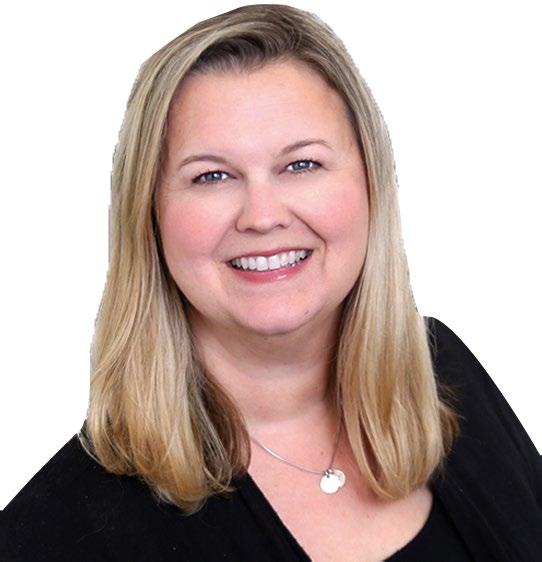
■ EDITORIAL
Editor
Henriette Campagna hcampagne@lawyersweekly.com
Reporter
Haviland Stewart hstewart@nclawyersweekly.com
Digital Media Manager
Scott Baughman sbaughman@mecktimes.com
■ CIRCULATION
Audience Development Manager
Disa Ehrler
dehrler@bridgetowermedia.com
Circulation
1-877-615-9536 service@bridgetowermedia.com
■ ADVERTISING
Advertising Account Executive
Sheila Batie-Jones sbatie-jones@sclawyersweekly.com
■ ACCOUNTING & ADMINISTRATIVE
Business Manager
Michael McArthur mmcarthur@bridgetowermedia.com
■ ART & PRODUCTION
Creative Director
Melanie Bingham
Project Management
Jordan Mazuranic
Production Specialist
John Reno
Director of Production Services
Bradley Redmond
SCLAWYERSWEEKLY
South Carolina Lawyers Weekly (USPS #020216) is published Monthly with General Statewide Circulation by South Carolina Lawyers Weekly at 130 N. McDowell St. Unit B, Charlo e NC 282042411. (919) 829-9333, (800)-876-5297.
Periodicals postage paid at Charlo e, North Carolina 28228-9998.
POSTMASTER - Electronic Service
Requested. send address changes
to South Carolina Lawyers Weekly, Subscription Services, P.O. Box 1051 Williamsport, PA, 17703-9940
To place orders, temporarily stop service, change your address or inquire about billing: Phone: (877) 615-9536
Email: service@bridgetowermedia.com
To submit subscription payments, mail: Subscription Services P.O. Box 1051 Williamsport PA 17703-9940
©2023 BridgeTower Media. Material published in South Carolina Lawyers Weekly is compiled at substantial expense and is for the sole and exclusive use of purchasers and subscribers. The material may not be republished, resold, recorded, or used in any manner, in whole or in part, without the publisher’s explicit consent. Any infringement will be subject to legal redress.
BridgeTower OpCo, LLC d/b/a North Carolina Lawyers Weekly Media is an equal opportunity employer.
COVER STORY: TIPPING THE SCALES
p4 | Female attorneys in the Carolinas are closing the gender gap — but work still remains
FEATURE : FINDING HER VOICE
p8 | Emma Dean, the first female executive director of the SC Bar Association, on finding her voice
5 QUESTIONS WITH
p11 | Liz Washko, the first female managing shareholder at Ogletree Deakins, on ensuring pay equity
VERDICTS & SETTLEMENTS
p13 | The latest results on South Carolina legal action COURTS
p19 | 4th Circuit rules on web domain re-registrations
OPINIONS
p21 | Highlights of the latest state-level court opinions
CAROLINA PARALEGAL NEWS
p27 | Internships fuel interest in law careers
p30 | New e-filing system a work in progress
p31 | Q&A: Mikki Hancock
p32 | Q&A: Cheryl LeGrand


In 1970, Victoria Eslinger, a firstyear law student at the University of South Carolina, approached a Senate clerk with her application to serve as a page.
“He leaned down and looked at me and said, ‘Well, you’re a girl,’ and I said, ‘Yes sir,’” Eslinger said. “He said, ‘Well, we don’t hire girls. If you were your brother, we would be happy to have
you.’ I said, ‘I don’t think you can do that. I think that’s a violation of the 14 th Amendment.’

“He leaned down and patted me on the head and he said, ‘So, sue me.’ So, I did.”
As a first-year law student, Eslinger brought a lawsuit against the governor and the South Carolina Senate for discrimination. Her lawyers included Jean Toal, who later became chief justice of the South Carolina Supreme Court, and Ruth Bader Ginsburg, former associate justice of the Supreme Court of the United States.
“It took three years,” Eslinger
said. “And now there are women in South Carolina’s Senate as pages. Now we have women senators, I’m happy to see. This was sort of the beginning.”
Eslinger graduated from the University of South Carolina School of Law in 1973 as one of five women in her class. She went on to form the South Carolina Women’s Lawyers Association, and is now a senior counsel at Nexsen Pruet, and a faculty member at Harvard University School of Law.
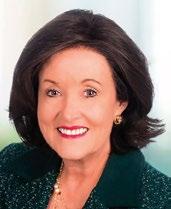
Eslinger’s is among the genera-





See Page 5

Femaleattorneys in the Carolinas are closing the gender equality gap — but work remains Victoria Eslinger
tion of women that paved the way for female attorneys across the Carolinas, and nationally.
“When I started practicing law, only 3% of the nation’s lawyers were female,” Eslinger said. “I remember somebody thinking it was a great compliment to tell me I was pretty smart for a woman.”
While the discrepancy between men and women in leadership positions in the law field remains, according to a 2020 global study conducted by the Thomson Reuters Institute, women now make up 56% of junior associates. While this is a notable improvement from 50 years ago there is still work to be done.
“I know women go into law school pretty equally, if not more than men right now,” Aindrea Pledger, attorney at Daggett Shuler said.
“However, when you look at leadership, that is just not the case. There’s not nearly as many women partners in organizations. I think that having all the perspectives at the table is very important, because the people we represent are extremely diverse. The world is diverse, so we must have diverse voices at the table.”
Despite the fact that industry data shows gender diversity to have positive impacts on law firm performance, women account for only 24% of equity partners, according to the 2020 study.
Owner and founder of Sharp Law Firm, and immediate past president of the South Carolina
Bar, Mary Sharp is among women in leadership roles in the Carolinas.



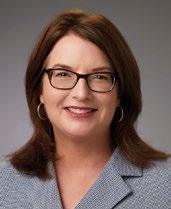

“When I started practicing law about 30 years ago, I was in a small, rural part of the state,” Sharp said. “I’m a trial lawyer, so I found myself going to roster meetings and seeing portraits of men on the walls, and not many women in the courtroom with me, and I experienced periodic discrimination or harassment.”
Lingering cultural attitudes about women’s roles in the home has been identified as a barrier for women in the law field.
“Sometimes you walk into a place and people seem surprised,”
Regina Hollins Lewis, Member at Gaffney Lewis LLC said. “They look at you like, ‘Oh gosh, this is not who I thought it was going to be.’”
Since then, Sharp has noticed the importance of mentorship among female attorneys and has gotten involved in many organizations that provide community and support to women in the law field. In the past, she has acted as president of the South Carolina Women’s Lawyers Association, and president of the National Conference of Women’s Bar Associations.
“I saw that there were ways women’s lives could be improved as lawyers,” Sharp said. “Getting involved in bar organizations and
women’s bar organizations was a way to try to help further women’s roles in the legal profession.”
The theme of community and mentorship is echoed by many other women in law across the Carolinas.
“The way to survive as a woman in law, is to surround yourself with other women in law,” Pledger said.

Despite the organizations and associations aimed at supporting women attorney, nationally, women are choosing to leave law after facing barriers. According to an American Bar Association study, by age 50, women make up only 27% of the profession.
The ABA report includes input from more than 1,200 big firm lawyers who have been in practice for at least 15 years.
According to the study, women were far more likely than men to report factors that blocked their, “access to success,” including lacking access to business development opportunities, being perceived as less committed to career, and being denied or overlooked for promotion.
“At the 10 to 12 year mark is really where we’re seeing women leave,” Samantha Sliney, attorney at the U.S. Air Force, and North Carolina Association of Women Attorneys immediate past president said. “In different surveys and data when you ask women why they leave, many will cite striking the balance between career and parenthood, they will cite lack of support, like lactation support, they will cite lack of
See Page 6
Continued From Page 5
standardized parental leave.”
The research showed that although firm leaders and male partners believe their firms are succeeding in advancing experienced women, women tend to disagree. For example, 84% of managing partners agreed that their firms have succeeded in promoting women into leadership, and 75% of experienced men agreed whereas just 55% of women agreed.
“The fact that women find themselves in the position where they feel like they had to choose between the family they wanted and the career they wanted, I find to be very sad,” Sliney said. “What that tells me is that we don’t have the support and protections under the law that mandate employers to provide that support to women so they feel like they can do both.”
To create support and equality within firms, Jennifer Van Zant, partner at Brooks Pierce, believes it is vital for people to be cognizant of their unconscious bias, and educate themselves about the discrepancy in compensation and leadership.

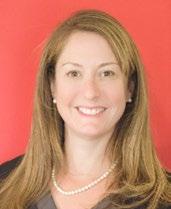
“I would like people to look at their own firms and their own situation and try to identify what barriers there are to success within their organization,” Van Zant said.
According to Pledger, in order to combat the lack of retention of female attorneys, women’s voices need to be involved in creating policies to cultivate an environment that will retain more women.
“Biologically and anatomically, we face different phases of womanhood that men don’t face,” Sliney said. “It just requires differing levels of support for us to be able to manage a career, and womanhood, and motherhood –should you decide to have children.”
According to the ABA study, flexible working arrangements have been cited as an effective method to increase women’s ability to reach senior management roles.
“The pandemic really ushered in a lot of remote work,” Pledger said. “I think that has been helpful for working parents a lot of which are moms. We’ve been able to have remote depositions and remote hearings. All of those things that allow flexibility into the schedule help retain working mothers.”
Since remote and hybrid work became more common, woman have faced less difficulty in their legal career and ultimately rising to leadership positions, which has a long term effect on women in the law field.
“Once you see the example of women in leadership roles, it really just inspires hope for those that are younger that it is attainable,” Sliney said. “Organizations like North Carolina Associations of Women Attorneys strives to ensure that example is out there and that we are setting the stage and creating an environment where women can be successful in the legal profession.” Leadership outside of law firms, but in the bar, are seeing similarly increased trends of women in leadership roles over the past few
decades. As the 123 rd president of the North Carolina Bar Association, Caryn McNeill, partner at Smith Anderson, was the seventh woman to hold the position.

“We’ve stopped counting in that way though, which I think is a good thing,” McNeill said. “It’s normal enough that people have lost track of what the number is.”
While the gender disparity in law field leadership remains prevalent, according to
Annemarie Pantazis,Managing Partner at Wilder Pantazis Law Group, it no longer viewed as abnormal for women to hold these positions.
“I think women have made so many strides, but what I love the most is that it’s not unusual anymore to be a woman who owns a law firm or a woman who’s a managing partner or a woman who has a seat at the table, it’s typical,” Pantazis said. “I think that’s the biggest stride, that’s not unusual. It’s becoming the norm and not the exception, which is exactly where it should be.”
To keep the advances that women have made in the law field, Eslinger echoes the words of her former attorney, Jean Toal, urging female attorneys in leadership roles to “keep the ladder down,” and help their fellow women in law reach similar success.
“I do a lot of talks to young women lawyers,” Eslinger said. “I usually end it by telling them that I hope they’ll live their lives in such a way, that every morning when their feet hit the ground, Satan shutters and says, ‘Oh crap, she’s awake.’”



As the first female executive director of the SC Bar Association, Emma Dean sees an opportunity for service
Walking through the Court of Appeals, side by side with respected judges, the rush in Emma Dean’s chest confirmed she was in the right place.
Dean grew up in the small town of Due West, S.C. There was a four way stop and no traffic lights. She inherited a passion for service to her community from her parents, both of whom worked as college educators.
After 16 years of public service through various legal platforms, Dean became the first woman to hold the position of executive director of the South Carolina Bar Association in January 2023.
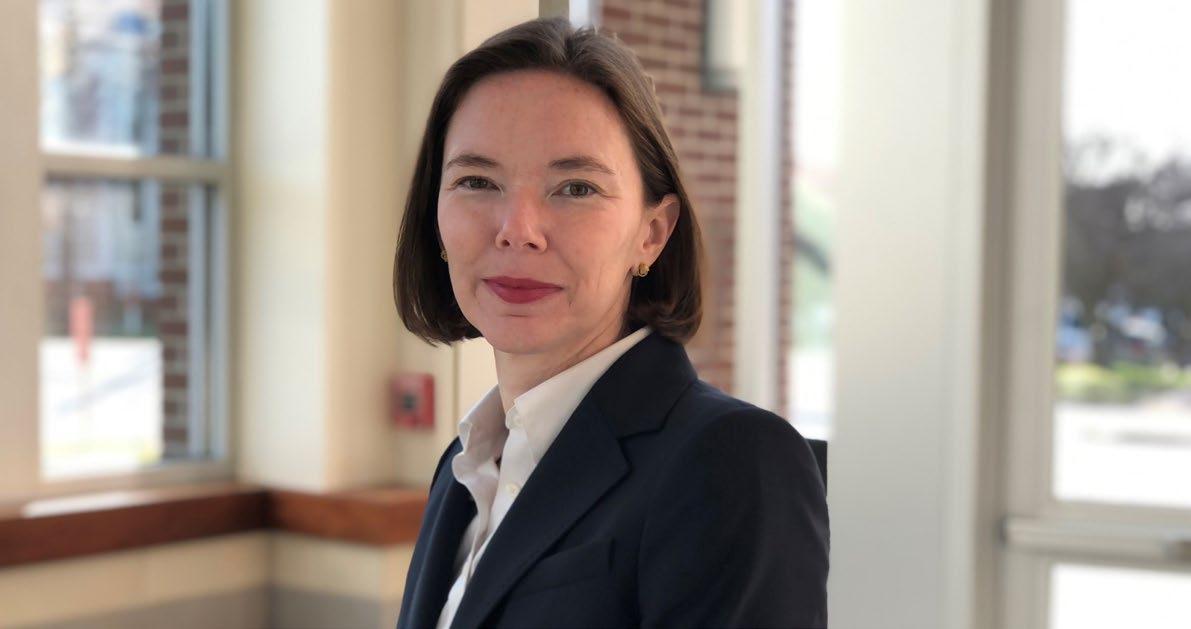
Dean attended Washington and Lee University where she double majored in politics and economics, and then went straight to law school at University of South Carolina School of Law.
After graduating, Dean began working as a staff attorney at the Court of Appeals and immediately confirmed her decision to practice law.
“Working at the Court of Appeals was an amazing experience because I was fresh out of law school and didn’t know many lawyers,” Dean said. “And then here I was walking the halls with these incredible judges.”
Dean joined Judge John Kittridge’s chambers in the Court of Appeals
shortly after and remained with him when he was elected to the Supreme Court.
“I suddenly found myself surrounded by mentors, who took an interest in helping me and helping me develop and it was just incredible,” Dean said. “It’s an awesome thing to know and to find people with similar interests in service and dedication to justice.”
Dean worked in civil litigation at Nelson Mullins before she went to work at the statehouse for the House Judiciary Committee, first as assistant chief counsel and later as chief counsel.
See Page 9
Continued From Page 8
“I was really excited about working as chief counsel because I really got to utilize my interests those while working with the public,” Dean said. “I was helping members as they draft legislation and really trying to problem solve. Constituents or members would come to me with problems that they were hearing about in their communities, and we’d look at the law and look at ways to help solve these problems.”
As executive director of the South Carolina Bar Association, Dean hopes to strengthen the member services to support attorneys, cultivate relationships with attorneys throughout the state, and continue to serve her community.



“I’m very grateful for this opportunity,” Dean said. “It’s a huge opportunity for service. I believe in fairness, and I believe in serving this legal system that we’ve all dedicated our lives to. It’s a huge honor to get to do that.”
As the first woman to hold this position, Dean wants to be a voice for younger female attorneys.
“Relationships are very important to me,” Dean said. “Communication is very important to me. I want to hear from them and hear what support they need in order to be the best advocates they can be.”
From a young age, service, fairness, justice, and giving back to your community have been important to Dean.
“The more you serve others, you get the opportunity to see them grow and make a difference in this world,” Dean said. “There’s no cooler thing than to see that.”
As a first generation lawyer, Dean recognized the difference that having strong mentors made in the development of her career. Dean is now a volunteer mentor for first semester students at the University South Carolina School of Law and has fostered relationships with law clerks that have worked for her at the State House.
“I think it’s very important to help the next generation,” Dean said. “My mentors made a huge difference in my life. Anybody who’s willing to have me as a mentor, I’m very interested in helping, just as I’ve been helped.”
Since law school, Dean has remained in Columbia. She now lives with her husband and their four children. When she is not serving the law community, Dean spends her time
coaching sports teams that her children play on or hiking in South Carolina State Parks.


To hear more from Dean, check out the Q&A below.
Q: As an avid hiker, what are your favorite trails in South Carolina?
A: South Carolina has beautiful parks throughout the state, and we loved visiting the 47 state parks. We especially enjoyed feeding the fish and walking along the river at Jones Gap, hiking to the waterfall at Oconee Station, and taking a boat at Hunting Island to St. Phillips where we spotted a bald eagle family.
Q: What do you consider the biggest perk of growing up in a small town?
A: Growing up in a small town was so neat because of the independence it gave me. My mom would let me ride my bike around town, and this was before cell phones. I now know, Mom had tons of eyes in the village watching out for me, which leads me to awesome second perk, community.
Q: What is a piece of advice you would give to those with a similar passion to serve their community?
A: Keep working hard and serving the community. Good news does not always make headlines, but you are doing something more important, changing lives.
Q: Who are a few of the most influential people in your life and what have they taught you?
A: My parents are my greatest influence. My dad was a chemistry professor for 50 years, and my mom was a special education teacher for years and later became an assistant dean of students. They lost everything in apartment fire 6 months after moving to the United States. Instead of grabbing their possessions, they ran around the building getting everyone
out. That was my parents. Service above self and bravely finding a way.
Q: As the first woman to hold the position of Executive Director for the South Carolina Bar, what is the significance of you stepping into this role?
A: I am grateful to everyone who has come before me, and I am honored by the amazing support I have received by attorneys across the state. I promise to do my very best to serve them well.
Q: What has been the most fulfilling part of your career?
A: Mentoring others. I have been so fortunate that others invested time in helping me as a young attorney, so it is a privilege to pay that forward to others.


A law firm with multiple locations has expanded its Charleston office space while adding several key attorneys.
Saxton & Stump has moved up a floor in its current building at 151 Meeting St., according to a news release from the firm.
The firm also has made several personnel additions, including attorney Rene Dukes has joined its Charleston office as an equity shareholder, the release stated.
Saxton & Stump also has added Emily Ford and M. Calvin Brackin as attorneys. Dukes will lead the Family Law Group, and continue to practice education law and represent businesses in labor and employment.
“Bringing in Rene and Emily to start our Family Law Group and Calvin as another business litigator in the office
will provide additional bench strength for our South Carolina clients,” Saxton & Stump CEO James W. Saxton said. “The success our Charleston office has experienced in just the last eight months has been tremendous. We are looking forward to continuing this growth.”
Dukes comes into Saxton & Stump as an equity shareholder, and in addition to her family law practice, she is part of the firm’s Education and Labor and Employment groups. She earned her law degree magna cum laude at the Charleston School of Law and her undergraduate degree from the University of Virginia. Brackin is an associate and part of the firm’s Commercial Litigation group as well as the Business, Corporate and
Tax Group, the release stated. Brackin earned his law degree at the Charleston School of Law and is a graduate of Clemson University, where he earned a degree in economics.
Ford is a member of the Saxton & Stump Family Law and Commercial Litigation groups. She graduated magna cum laude from the Charleston School of Law and earned her M.B.A. and undergraduate degrees from the University of Charleston in West Virginia.
All new hires will work out of the expanded Charleston office that opened earlier this month, which nearly doubles the firm’s space. Additional expansion plans are already underway. Staff report

5
Liz Washko was recently elected firm-wide managing shareholder at Greenville-based firm Ogletree Deakins. After assuming the role in January 2024, Washko will be the firm’s sixth managing shareholder and the first woman to serve in the position.

Washko has practiced in Ogletree Deakins’ Nashville office since 2000 and has held virtually every leadership role within the firm, including being a member of the Compensation Committee, and office managing shareholder in Nashville for eight years.
Washko is currently one of the firm’s two managing directors and has served on the board of Directors since 2021. She co-founded Ogletree Deakins’ Pay Equity Practice Group in 2016, which she continues to co-chair.
Washko has particular expertise representing clients in the restaurant, retail, health care, and manufacturing industries. She also has a substantial experience defending employers in Fair Labor Standards Act collective actions, in pay discrimination cases (individual plaintiff and class/collective actions) and conducting proactive pay audits and pay equity analyses.
Washko is a member of the American Health Lawyers’ Association and previously served as chair of the organization’s Labor and Employment practice group. She is also a member of the
Subcommittee of the American Bar Association’s Labor and Employment Section. Washko earned both her J.D. and B.A. from Rutgers University.
Q: What do you consider your most important traits that led to you being named the first female managing shareholder at Ogletree Deakins, and how do you grow as a leader?
A: While the question might be better directed at those who made the decision, my own view is that I am a hard worker, analytical, and decisive, have strong emotional intelligence, and I am a good communicator. In terms of growing as a leader, I study and try to internalize lessons from other strong leaders I have observed or learned about. I also am very open to and invite constructive feedback, and I work to learn from mistakes.
1 2
Q: What obstacles have you overcome as woman in the legal industry, and how can your background help inspire other female attorneys to aspire to leadership and executive roles?
A: I honestly believe I have been very fortunate in the experiences I have had
as a woman in the legal profession. However, I can identify two issues that occurred, which are quite common, that might be considered as potential obstacles. I have had people make assumptions about what I would be willing and able to do (especially after having children), and I have often been underestimated (especially as a younger lawyer). In both cases, I simply rejected the assumptions and underestimation and showed them what I could do.
Honestly, being underestimated is an opportunity, especially when it is an opposing counsel who is underestimating you. In terms of inspiring others, while my law firm success looks relatively traditional (associate, shareholder, equity shareholder, leader), I have always had my own way of doing things that work best for me. I think that the way my career has developed, with the ability to maintain what I consider to be a successful personal life, shows that there is not just one way or just one path to success.
3Q: What are the crucial steps that employers must take to ensure pay equity, especially when there are variations in pay?
equal work are paid the same, unless there are legitimate factors justifying a pay difference (such as relevant education, work experience and performance). As you may have noted, one of my focus areas is pay equity. I founded and co-chair Ogletree Deakins’ Pay Equity Practice Group and work with clients every day on pay equity analyses and compliance. I encourage employers to conduct self-critical analyses of their compensation programs and actual pay, under attorney client privilege (which enables the employer to be truly objective) to identify opportunities to improve their programs and/ or adjust compensation.
The goal is that any pay differences can be explained by legitimate factors. This may include steps such as modifying applicable policies and procedures, implementing market/ job based pay ranges, training decision-makers on how to make good decisions in line with policies, and conducting periodic pay equity analyses.
Q: How has pay/equity evolved over the past decade, and where do see it 10 years from now?
A: The Equal Pay Act was passed in 1963 and Title VII was passed in 1964. These laws and the many state laws that are similar to them, have been in place to prohibit pay discrimination (Title VII) and/or unexplained pay disparities between men and women (EPA) for a long time. However, within the past 10 years, pay equity has become a hot button issue. State laws and other developments have caused employers to examine their compensation policies and procedures more closely and assess whether there are pay equity issues that need to be addressed. If legislative trends continue at their current pace, I think we are going to see more drive for pay transparency — whether that relates to posted or published pay ranges (currently required in a handful of jurisdic -
tions) or even more openness about individual employee pay.
Q: What are you passionate about outside of the workplace, and how do you unwind from a stressful day?
A: Of course, I am passionate about my family and friends — particularly my two sons. I am also an avid reader, and I love music, theater, and travel. When I have had a particularly stressful workday, I have some playlists that I listen to on the drive home from work to help me let go of much of that stress before I walk in the door to my home life. My favorite ways to unwind during my downtime include time spent with my husband, kids, and friends, or reading one of several books, I always have in progress (paper book, Kindle book, Audible book). I am also a backyard bird feeder and find a lot of peace and enjoyment watching the local birds and other creatures eating at the feeders.
The Charleston Group, one of the largest minority-owned law firms in the southeastern United States, has announced that President Joe Biden has appointed one of its attorneys, Steve Benjamin, as senior advisor and director of the Office of Public Engagement.
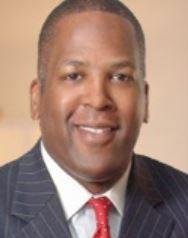
The White House Office of Public Engagement works at the local, state, and national levels to ensure a diverse set of leaders and perspectives have the opportunity to inform the president's policies in an inclusive, transparent and responsible way.
"Steve has his finger on the pulse of America. He has a keen understanding of government's role in strengthening communities and businesses," said R. Jonathan Charleston, the firm's managing principal. "We are honored to have had Steve as a member of our firm and excited for his new opportunity to serve the American people."
Benjamin added: "I am honored to have President Biden's confidence and look forward to assisting him in executing his bold agenda for America as Senior Advisor and Director of the Office of Public Engagement."
Benjamin joined the firm in 2020 and co-chairs the firm's extensive Public Finance and Affordable Housing Practices. His experience with bonds
and other revenue-based obligations used by local governments helped drive the growth of the Firm's public finance practice.
For 10 years, Benjamin served as the mayor of Columbia, S.C., leading the city through a tremendous period of growth. He also served as executive chairman of Municipal Bonds for America. In 2019, Benjamin completed his term as the U.S. Conference of Mayors' 76th President.
The Charleston Group has one of the most experienced Public Finance practices of any minority-owned firm in the country. The Firm's lawyers have extensive experience serving issuers as bond and disclosure counsel and as underwriters' counsel to investment banks.
Staff report
Is this a verdict or a settlement? Verdict
Type of case: Enhanced injury product liability
Amount: $2.8 million
Injuries alleged: Brain injury
Case name: Dominique L. Alexander vs. BMW of North America LLA
Court: U.S. District Court for the District of South Carolina Spartanburg Division
Case No.: 7:18-cv-03065-JD
Judge: Judge Dawson
Date of verdict: Feb. 3, 2023
Demand: An excess of $8 million
Bench or jury trial? Jury trial
Special damages: Pain and suffering, loss of enjoyment of life, and punitive damages
Most helpful experts: Mike Markushewski, Kelly Kennett, and Chris Caruso
Attorney(s) for plaintiff and their firm(s): Kevin Dean, Lee M. Heath, and John David O’Neal of Motley Rice LLC. Attorney(s) for defendant and their firm(s): Thomas Branigan and Patrick Cleary of Bowman and Brooke
Was the opposing represented by counsel? Yes
Were liability and/or damages contested? Yes Has the judgment been successfully collected? Not yet
B y H aviland S tewart hstewart @ nclawyersweekly . comOn Feb. 3, a jury in Spartanburg, S.C., handed down a $2.8 million verdict on behalf of a plaintiff who was seriously injured in a car accident when her 2015 BMW 528i’s airbag failed to deploy.
According to one of the plaintiff’s attorneys, Kevin Dean, in June 2017, during what should have been a typical rear-end collision, her vehicle lost power following rear impact, resulting in the failure of multiple safety features including the airbag and seatbelt.
“In our case, the battery was located in the trunk of the vehicle, and it was a rear end collision first followed by a front [collision],” Dean said. “So, the power source was damaged, and the air-
bag didn’t deploy.”
The plaintiff survived the crash with a severe brain injury and a host of other injuries, Dean reported.
According to Dean, the plaintiff hit her forehead on the steering wheel with 1,000 pounds of force, resulting in subdural and subarachnoid hemorrhages. This brain injury caused neurological symptoms that will permanently affect the plaintiffs’ judgment, decision making, and personality.
“So much of safety devices in our vehicles, including airbags and seatbelts, are all tied to electronics and power sources,” Dean said. “If you lose power to your car, in BMW at least, you lose all your safety devices.”
This products liability action includes claims for general negligence, gross negligence, reckless conduct, and strict liability in tort, Dean reported.
“We were arguing that the failure of that airbag to deploy in this frontal collision was defective and unreasonably dangerous,” Dean said.
The plaintiff also suffered a compound fracture of her arm as a result of the front collision, as well as other injuries as well that her counsel alleged could have caused by the rear collision, and therefore did not claim to be the fault of BMW.
According to Dean, the plaintiff’s medical expenses totaled at approximately $440,000.
“We are thrilled to bring these financial resources to our client and also proud to be able to move forward with our commitment to the jury to continue investigating this defective product so that we can learn more and work to remove it from the roadways,” Dean said. “If you have this car, please let us know immediately.”
Type of Case: Insurance Bad Faith
Verdict or Settlement? Settlement
Case name: Withheld
Case no.: Withheld
Settlement Amount: $1 million
Plaintiff’s Counsel: Doward K. Harvin of Sabb Law Group, Scott C. Evans and James B. Moore III of Evans Moore, LLC
Defense Counsel: Wesley Sawyer
Venue: United States District Court, Florence Division
Most Helpful Experts: Andrew O. Wood, J.D. and Oliver Wood, (Economic loss in underlying tort action), Timothy Osbon (Life care plan in underlying tort action), M. Dawes Cooke Jr. (declaratory judgment action).
Was Liability Contested: Yes
In August of 2021, counsel obtained a default judgment of $3.13 million against an apartment complex in Kingstree, S.C., on behalf of a visitor who sustained a hip fracture and required multiple surgeries as a result of defects in a common area stairwell.
A lawsuit was filed and served upon the owner of the apartment complex. According to the plaintiff’s attorney, Scott Evans, the same day, the apartment complex forwarded a copy of the lawsuit to the complex’s property management company who had purchased the insurance policy.
Notice was then provided to an employee of the Cone Co., an Alabama retail insurance broker who sold a policy issued by Capitol Specialty Insurance Co., which covered the Kingstree property as well as other apartment complexes that were managed by a common group of property management companies, Evans reported.
According to Evans, a Cone Co. employee provided evidence of purportedly turning the claim into
Capitol Specialty Insurance Co. by and through a wholesale broker designated by the carrier to accept notice. The evidence of notice remains in dispute, plaintiff’s counsel reported.
Although Capitol Specialty Insurance Co. had notice of the damages hearing in the underlying tort action, it did not provide a defense to the apartment complex but instead filed a declaratory judgment action against the complex and the injured visitor in the U.S. District Court for the District of South Carolina, counsel reported.
Following the entry of judgment in the underlying tort action and service of the declaratory judgment action upon the apartment complex, the apartment complex assigned its rights to bring a bad faith and breach of contract action against Capitol Specialty, the Cone Co., and the complex’s management company to the injured visitor who had received the judgment.
A bad faith and breach of contract suit was filed in Williamsburg County the following day, and subsequently removed to the U.S. District Court. The Cone Co. tendered its policy limits following removal, Evans reported.
Since the settlement, the bad faith action filed on behalf of the apartment complex by the plaintiff has been remanded to the Court of Common Pleas for Williamsburg County. The state case remains pending against Capitol Specialty Insurance Co. and the complex’s management company, as does the declaratory judgment action brought by Capitol Specialty Insurance Co. against its insured and the injured visitor.
The defense counsel did not respond for comment.
Amount: $1 million
Injuries alleged: Nerve damage and partial paralysis
Case name: Duane Keezer and Sharon Keezer vs. The United States of America
Court: U.S. District Court for the District of South Carolina
Case No.: 2:21-cv-01985
Judge: David Norton
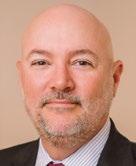
Date of settlement: Nov. 15, 2022
Most helpful experts: Dr. Robert Powers (hospitalist) of Charlottesville, Virginia Attorneys for plaintiff: Brad Lanford and Janek Kazmierski of the Law Offices of Kenneth E. Berger in Columbia and Thomas Valet of Rappaport, Glass, Levine, & Zullo in Islandia, New York
Attorney for defendant: Assistant U.S. Attorney Christie Newman of Columbia
B y H eatH H aMacHerA Navy veteran who suffered permanent paralysis of his legs after being misdiagnosed at a veterans’ hospital has settled his medical malpractice claims for $1 million, his attorneys report.
When Duane Keezer visited the Ralph H. Johnson Veterans Administration Medical Center (VAMC) in Charleston on March 2, 2017, he was told that the radiating lower back and groin pain he felt could be remedied with pain medication and muscle relaxers. As such, he was given a prescription and discharge papers.
But just 10 days later, back in the hospital for the same ailment, medical providers at the Waccamaw Community Hospital
noted signs and symptoms of a central nervous system infection, Keezer’s attorneys said, and diagnosed him with a potentially life-threatening spinal epidural abscess. The diagnosis led to Keezer being transferred back to VAMC for imaging studies to confirm the diagnosis and, if required, treatment.
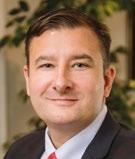
Keezer was represented by Brad Lanford and Janek Kazmierski of the Law Offices of Kenneth E. Berger in Columbia and Thomas Valet of Rappaport, Glass, Levine, & Zullo in Islandia, New York.
“Despite the indications of an infection and a diagnosis of spinal epidural abscess, no treatment was initiated for many hours,” Keezer’s attorneys wrote in a statement to Lawyers Weekly. “During this delay in treatment, (Keezer’s) condition worsened.”
The attorneys said that their client suffered from night sweats, chills, and numbness and weakening of his legs.
“Ultimately, due to the significant delay in confirming and treating the spinal abscess, Duane suffered spinal cord injury resulting in permanent paralysis of his legs,” the attorneys wrote.
Keezer’s attorneys noted that the case was settled after mediation originally ended in an impasse.
The defendant was represented by Assistant U.S. Attorney Christie Newman of Columbia. Newman did not immediately return a message requesting comment.
Amount: $2.5 million
Injuries alleged: Partial confinement to a wheelchair
Case name: Confidential
Venue: Confidential
Case No.: Confidential
Date of settlement: Confidential
Most helpful experts: Confidential
Insurance carrier: Confidential
Attorneys for plaintiff: Daniel “Danny” Henderson of Parker Law Group, (Ridgeland); Bert “Skip” Utsey of Clawson Fargnoli Utsey, (Charleston)
Attorney for defendant: Confidential
B y d avid B aug H er
A $2.5 million settlement has concluded the medical malpractice case of a man who claimed injury from late diagnosis of spinal abscesses.
“No staff had an explanation as to why the orders for the MRIs were discontinued the following day,” said Danny Henderson of Parker Law which represented the plaintiff along with Bert “Skip” Utsey of Clawson Fargnoli Utsey.
According to a summary of the case from Utsey’s office, imaging of the cervical and thoracic spine were ordered upon arrival of the man at the emergency room but they were delayed “without valid explanation”.
“Despite the client’s continued neurological decline, no MRIs were obtained until the following Tuesday and only after the plaintiff had lost all sensation in and the ability to move his lower extremities,” said the summary which noted the potential for abscesses was eventually diagnosed by the man’s personal cardiologist during a visit to the hospital.
The summary said that emergency MRIs confirmed the problem and the patient was treated with spinal decompression and intensive rehabilitation however he was left mostly confined to a power chair with only minimal ability to walk.
Henderson described his 68-yearold as being active with his business, church and community.
“Unfortunately, most of that came to a screeching halt when he had this event,” he said.
Utsey said there were some contentions over the size of the suggested life care plan however there was little dispute over the extent of injury. Some of the argument came over how much those injuries might have been prevented by timely imaging.
“There is a period of time within which you need to act in order to preserve nerve function and there is some debate in the medical community on what that duration is and how quickly you need to act,” Utsey said in a separate interview. “That was another issue there as to whether intervention at the point in time where we said they should have gotten the MRI and followed up with the necessary surgery could have been done quickly enough to preserve some neurological function that he ultimately lost.”
Henderson said the treating physician was used as an expert in the plaintiff’s case.
“We knew that he was going to be a witness,” he said, “so rather than finding an expert in the traditional manner, we decided to go to this doctor who very graciously and thankfully proved to be a very good patient advocate and made an extraordinary witness on deposition.”
Utsey’s summary said the plaintiff introduced evidence that a better outcome was possible.
“The neurosurgeon who decompressed the client’s spine testified that, if he had had an opportunity to
operate on the plaintiff several days earlier, he believed the plaintiff would be walking today,” it said. Under the terms of the settlement, which also covered his spouse’s loss of consortium claim, the names of the parties were kept confidential.
Is this a verdict or a settlement? Settlement
Type of case: Motor Vehicle Wreck
Amount: $600,000.00
Injuries alleged: Subarachnoid (brain) bleed and concussion
Case name: Withheld
Court: Withheld
Case No.: Withheld
Date of settlement: December 16, 2022
Special damages: $56,272.77; $21,354.41 (medical bills); $24,406.00 (property damage); $10,512.36 (lost wages/misc.)
Insurance carrier: Withheld
Attorney(s) for plaintiff and their firm(s): Christina Brown with the HHP Law Group
Attorney(s) for defendant and their firm(s): Steven Eston Price with Clawson and Staubes
Was the opposing represented by counsel? Yes
Were liability and/or damages contested? While defense counsel filed an answer denying liability and damages, as a practical matter, neither were substantively contested.
Has the judgment been successfully collected? Yes
B y H aviland S tewart hstewart @ nclawyersweekly com
On May 12, 2022, the plaintiff, who was a flight paramedic in the Army National Guard was T-boned by a drunk driver who ran a redlight. According to plaintiff counsel Christina Brown, the plaintiff’s injuries included a subarachnoid brain bleed and concussion.
“As a result of her injuries, plaintiff was temporarily removed from flight status and faces a medical clearance process to return to fly-
ing with her crew,” Brown said. “Her military career was seriously impacted by this accident.”
According to the video footage from South Carolina Highway Patrol, obtained by Brown, multiple witnesses described the defendant’s driving leading up to the collision as erratic and dangerous.
Ultimately, it was determined that the defendant BAC was 0.24 at the time of the accident. Upon further investigation, Brown discovered that the defendant had previously been charged with at least twelve counts of driving under the influence.
uninsured motorist benefits, $75,000.00, for a total recovery of $600,000.00.
“The plaintiff had had a great team of attorneys on her side,” defense attorney Steven Eston Price said. “I’m thankful that we were able to get the case resolved.”
Is this a verdict or a settlement? Settlement
According to the plaintiff’s counsel, Fatima Zeidan, the plaintiff sustained a lower back injury, a torn rotator cuff, and a partially torn meniscus. As a resulting of the fall, the plaintiff underwent a total of five surgeries, and medical expenses totaling around $400,000 at the time of mediation.
Christina BrownWhile the defendant was uninsured, the owner of the vehicle, the defendant’s livein girlfriend, maintained a liability policy with limits of ($50,000/$100,000).
The same day Brown received the declaration page from the liability carrier, a time-demand package was sent to the liability carrier in accordance with Tyger River, offering to settle the plaintiff’s claims in exchange for policy limits. According to Brown, no representative from the liability carrier reached out to the plaintiff’s counsel. Suit was filed in Richland County, S.C. which included a negligence claim with respect to the defendant and a negligent entrustment claim with respect to the owner of the vehicle.
Shortly after the suit was filed, the liability carrier offered to pay the limits of the policy, which was rejected by the Plaintiff. Ultimately, a settlement was reached between the plaintiff, defendant, and liability carrier for $525,000.00. Plaintiff also obtained the limits of her
Type of case: Slip and fall/premises liability
Amount: $1.25 million
Injuries alleged: Torn rotator cuff, meniscus tear, L4-5 laminectomy
Case name: Confidential
Court: Confidential
Case No.: Confidential
Judge: Settled in Mediation
Date of settlement: October 2022
Demand: Initial Demand was for $1 million, offer was $0. First mediation failed. A second mediation was held 10 months later where the case was resolved for $1.25 million. Weeks before the first mediation, an excess umbrella policy was disclosed.
Highest offer: $0 prior to mediation
Special damages: $350,000
Insurance carrier: Confidential
Attorney(s) for plaintiff and their firm(s): Fatima Zeidan, The Eichholz Law Firm, P.C. Attorney(s) for defendant and their firm(s): Confidential
Was the opposing represented by counsel? Yes Were liability and/or damages contested? Yes Has the judgment been successfully collected? Yes
B y H aviland S tewart h stewart @ nclawyersweekly comDuring the summer of 2016 the plaintiff and her husband traveled to the Charleston area and stayed at a second-story hotel room with outdoor entry. When leaving the next morning, the couple was walking down the stairs to get to their car when the plaintiff slipped on wet stairs and fell to the ground.
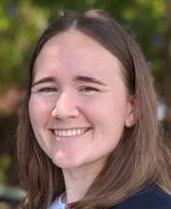
A pre-suit demand was sent demanding the hotel’s insurance policy limit of $1 million, which was denied by the defense. After a suit was filed, liability was contested and the hotel staff testified that they did not know where the water on the stairs came from, had never seen water on the stairs and that they had no notice of the water prior to this incident, Zeidan reported.
The plaintiff’s counsel obtained certified weather reports to dispel any notion that the water was a weather related event. According to Zeidan, she eventually tracked down a former maintenance personnel who admitted that it was part of his daily routine to hose down the exterior hallways and breezeways in the early mornings, clarifying where the water originated. A month prior to a second mediation, and after several years of litigation, a $5 million umbrella policy was also disclosed, Zeidan reported.
This case was resolved at the second mediation for $1.25 million.
Is this a verdict or a settlement? Verdict
Type of case: Civil rights claims under 1983 for excessive force and unlawful seizure. South Carolina tort claims act claims for gross negligence, assault, battery, false imprisonment, and negligent supervision/retention
Amount: $550k total verdict; $50,000 against individual
officer; $500,000 against the Richland County Sheriff’s Department
Injuries alleged: Pain and suffering and emotional distress due to being tazed
Case name: Webb v. Lott, in his official capacity as Richland County Sheriff and Cameron Duecker: C/A 3:19-2031-CMC
Court: Federal court in Columbia
Case No.: C/A 3:19-2031-CMC
Judge: Judge Currie
Date of verdict: Jan. 12, 2023
Bench or jury trial? Jury
Attorney(s) for plaintiff and their firm(s): Luke Shealey, Brian Shealey, and Caroline Latimer of the Shealey Law Firm, and Chris Truluck of Truluck Law Firm.
Was the opposing represented by counsel? Yes
Attorney(s) for defendant and their firm(s): Robert Garfield and Steven Spreeuwer of Crowe LaFave Law Firm, and Scott J. Hayes Attorney at Law
Were liability and/or damages contested? Yes
Has the judgment been successfully collected?
Not yet
B y H aviland S tewart hstewart @ nclawyersweekly comIn early January, attorneys went to trial in Columbia District Court on a case with Section 1983 Claims for excessive force and unlawful seizure against Officer Cameron James Duecker and claims under the South Carolina Tort Claims Act for gross negligence, assault, battery, false imprisonment, and negligent supervision against the Richland County Sheriff’s Office. They won a total of $550,000.
According to the plaintiff, Sheila Webb’s counsel, Luke Shealey, Brian Shealey, Chris Truluck and Caroline Latimer, at the event in question, Webb called 911 to help in a dispute with her brother concerning the use of her mother’s car. When Duecker arrived at Webb’s home, he became frustrated and threatened to arrest Webb for calling
911 for what he asserted was likely a civil matter, plaintiff counsel claimed. Webb then asked Duecker for his name so she could report him for his professional misconduct.

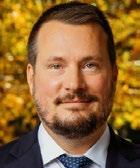
“Duecker then entered her home without permission, warrant, or exigent circumstanced combined with probable cause, and asserted he was going to arrest her for filing a false police report,” Luke Shealey said. “Ms. Webb retreated to her bedroom and got in bed, drawing the covers over her, and told him to leave because she had done nothing wrong.”
According to Luke Shealey, Duecker continued to try to handcuff her, however, after an initial struggle, he tazed her nine times.

Webb was ultimately charged criminally with assaulting a police officer while resisting arrest and breach of peace. Those charges were quickly dismissed.
According to Luke Shealey, the Sheriff’s Department’s counsel, Robert Garfield, and Steven Spreeuwers alleged that Duecker was acting outside the course and jurisdiction of his employment with intent to harm. However, Duecker’s attorney, Scott Hayes argued the opposite.
“My client was performing his duties in good faith within the official
scope of his duties,” Hayes said. “He did not act with actual malice or intent to harm as asserted by the Sheriff’s Department.”
Garfield and Spreeuwers failed to respond for comment.
The jury reached a verdict totaling $550,000, $50,000 against Duecker for the civil rights claims, and $500,000 against the Richland County Sheriff Department for the South Carolina Tort Claims. They did not find that the Sheriff’s Department was liable for the negligent supervision/retention claims.
Verdict or Settlement? Settlement
Type of case: Workers compensation
Amount: $675,000
Injuries: Hit in eye with metal paint roller
Case Name: Confidential
Plaintiff Attorneys: Christopher Hart and Justin Bamberg
Defense Counsel: Withheld
Has the judgment has been successfully collected? Yes
B y H aviland S tewart h stewart @ nclawyersweekly . com
A worker who was struck in the eye while at work reached a $650,000 settlement.
The plaintiff was working at a major manufacturing plant in the lower part of South Carolina when he was struck in the eye by a co-worker with a paint roller. According to the plaintiff’s counsel, Christopher Hart from Hart Law Firm, the co-worker who hit the plaintiff
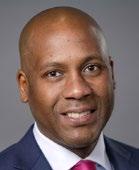

immediately fled the work site and never returned.
The Plaintiff was rushed to the emergency room with his eye bleeding. Due to this injury, the plaintiff incurred a total of $106,000 in medical bills.
“We filed a workers’ compensation claim with his employer who, in return, denied the claim stating that our client was guilty of fighting on the job,” Hart said. “The employer cussed at our client and fired him. The employer refused to take measures to ensure our clients’ medical bills and lost wages
were paid. The employer knew on the date of the injury that our client was not fighting because it was recorded on cameras located at the plant.”
After the plaintiff’s employer denied the worker’s compensation claim, plaintiff counsel filed a tort action against the employer.
The plaintiffs’ counsel elected to file a lawsuit against the employer for negligently hiring the co-worker with violent tendencies and failure to properly supervise the workplace. \
According to Hart, a workers compensation settlement would have been a significantly lower settlement amount because plaintiff was an unskilled laborer and low wage employee. However, because the defendant denied the workers compensation claim, the plaintiff was able to seek tort action against his employer.
On March 23, 2022, the plaintiff was awarded a $675,000 settlement.
Many details of this case have been withheld due to a confidentiality agreement.
COLUMBIA, S.C. (AP) — A Democratic lawmaker who called the late pastor of Emanuel AME Church a friend is continuing his push to make South Carolina the 49th state with a hate crime law.
After an avowed white supremacist murdered nine members of the oldest African Methodist Episcopal church in the U.S. South in 2015, Rep. Wendell Gilliard revamped his ongoing pursuit of enhanced state penalties for hate crimes.
Before adjourning that summer, lawmakers provided a special session might allow them to stiffen punishments for crimes motivated by bias against particular groups. But no such proposal has become law in the years since.
The measure took its first steps this year when a House subcommittee unanimously advanced the bill recently.
Gilliard told lawmakers that it brings "no pleasure" to discuss the issue every year. For Gilliard, the debate recalls memories of the attack on churchgoers he knew in the district where he was raised.
"It's a weight to carry," Gilliard told The Associated Press. "But you know you have to do it."
South Carolina and Wyoming are the only two states without a hate crime statute.
The proposal is named after Clementa C. Pinckney, the former state senator and pastor who died in the racist Charleston massacre. The bill would allow harsher punishments for perpetrators of violent crimes motivated by their perception of someone's race, color, religion, sex, gender, national origin, sexual orientation, or physical or mental disability. Additional fines no more than $10,000 and up to five years imprisonment could be imposed for anyone convicted.
The House approved a similar bill two years ago with bipartisan support. But it stalled in the Senate at the behest of eight Republicans who blocked debate.
Some opponents have said a state law is unnecessary when a federal statute already protects the groups. They cite the example of the Charleston shooter, who has sat on death row for six years after becoming the first person sentenced to death for a federal hate crime.
Gilliard said state laws are necessary amid a federal backlog. A July 2021
Department of Justice report found that U.S. attorneys declined to prosecute 82% of hate crime suspects from 2005 to 2019.
While the mass shooting in Charleston has provided increased impetus, many hate crimes draw less attention. The existence of a state law, according to Gilliard, can determine whether police collect evidence for a hate crime.
Recent FBI statistics show South Carolina had 110 hate crimes in 2020 — nearly double the 57 instances reported the previous year.
Others objected to the inclusion of gender and sexuality in previous bills. A House subcommittee axed protections for gay and transgender people in 2021 after a Republican leader said their inclusion would likely lead members of the majority party to withdraw support.
Conservative opponents have said they fear a hate crime law could be used to prosecute Christians who speak out against gay marriage.
Gilliard said that he would not compromise on the inclusion of gender and sexuality as protected identities.
Cybersquatters may violate federal law even if they aren’t the original registrants of the challenged domain, according to a ruling from the 4th U.S. Circuit Court of Appeals.
In a matter of first impression, the Fourth Circuit affirmed summary judgment against a Chinese company accused of violating the AntiCybersquatting Consumer Protection Act, or ACPA, by re-registering a domain name with a bad faith intent to profit.
“[W]e join the Third and Eleventh Circuits in holding that the term ‘registers’ and its derivatives extend to each registration of a domain, including the initial registration and any subsequent re-registrations,” Judge Stephanie D. Thacker wrote. “Where a successive registration of a disputed domain name postdates the trademark registration of the corresponding mark, the mark owner may show that
the successive registration was done in bad faith.”
The judge also concluded that the defendant wasn’t rescued by the ACPA’s “safe harbor” provision.
Thacker was joined by Senior Judge Henry F. Floyd and Judge Albert Diaz in The Prudential Insurance Company of America v. Shenzhen Stone Network Information Ltd. (VLW 023-2-024).
Prudential Insurance Company of America is a worldwide insurance and financial services company. In November 2002, Prudential registered several trademarks on the term PRU and other PRUformative marks in the U.S., as well as several other countries and territories. Because an unaffiliated company named “Prudential plc” uses the PRUDENTIAL trademark in China, Prudential agreed not to use its marks on
that country’s mainland.
Shenzhen Stone Network Information, or SSN, is a Chinese internet company that distributes financial and economic information to Chinese consumers online and focuses on the foreign exchange industry.
Zhaoyuan Zhang, a Chinese citizen and SSN’s CEO, purchased the PRU.COM domain name for SSN from an unidentified Texas company in October 2017. Zhang registered the domain with GoDaddy and agreed to its dispute resolution policy with jurisdiction in Arizona for most disputes.
Visitors to PRU.COM were routed to a GoDaddy landing page with pay-per-click hyperlinks displaying Prudential’s marks and those of its competitors, as well as the phrase “Would you like to buy this domain?”
See Page 20

A federal court has ruled that cybersquatters may violate the law even if they aren't original registrants of a challenged domain.. DepositPhotos
Continued From Page 19
Prudential anonymously offered to buy PRU.COM in March 2020. But SSN refused, saying it had already received a “six figure” offer for the domain and demanding the buyer’s location and business before quoting a price.
Shortly after SSN rejected its offer, Prudential filed for administrative dispute resolution, and again tried to buy the domain from SSN, this time offering $50,000. Zhang rejected the offer, explaining that SSN planned to develop PRU. COM into a website covering foreign exchange economic news.
After dispute resolution failed, Prudential sued Zhang, SSN and the PRU. COM domain name in the Eastern District of Virginia. Prudential claimed the defendants violated the ACPA by registering a domain name identical to their distinctive mark with the bad faith intent to profit.
The district court dismissed Zhang as a defendant for lack of personal jurisdiction, but allowed Prudential’s claims against SSN to proceed.
Even though SSN wasn’t the initial registrant of the domain, the district court determined that the ACPA encompassed subsequent re-registrations.
The district court concluded that SSN possessed the bad faith intent to profit from the disputed domain, granted Prudential’s motion for summary judgment and ordered SSN to transfer PRU. COM to Prudential.
Thacker explained that a cybersquatter who registers a domain identical or confusingly similar to a distinctive or famous mark with a bad faith intent to profit from the domain is liable to the trademark owner under the ACPA.
But “registers” isn’t defined in the statute. While other circuits have split on the word “registers” and its derivatives, Thacker said it was an issue of first impression for the court.
She noted that the Merriam-Webster Dictionary defines “registration” as “the act of registering,” and re-register merely means “to register again.”
“Therefore, the ordinary meaning of the word “registers” necessarily includes both the first registration and any subsequent re-registrations,” she wrote. “And because the ACPA does not expressly limit the term registers to only the initial or creation registration, we conclude that the re-registration of a domain name is a registration for purposes of the ACPA.”
SSN relied heavily on a 9th U.S. Circuit Court of Appeals ruling — GoPets Ldt. v. Hise — to bolster its contention that ACPA liability based on re-registration is improper since “[n]othing in the text or structure of the statute indicates that Congress intended that rights in domain names should be inalienable.”
Thacker said this reliance was misplaced.
“Because property interests are generally freely alienable, the Ninth Circuit declined to read the term ‘registration’ to include re-registrations because such an interpretation could frustrate the alienability of domain names,” she wrote. “While this concern is well-taken, it would be ‘nonsensical’ to not include re-registrations within the purview of the ACPA as it would allow for ‘the exact behavior that Congress sought to prevent.’”
Plaintiffs must satisfy two elements to prevail on a cybersquatting claim: the party using the domain had a bad faith intent to profit from it, and the domain name is identical or confusingly similar to or dilutive of a distinctive and famous mark.
“Here, there is no dispute that PRU. COM is confusingly similar to Prudential’s trademarked PRU because the parties agree that the domain name PRU.COM is identical to the trademarked term PRU,” Thacker said.
Thus, the “sole and dispositive issue” is whether SSN had a bad faith intent to profit from using the PRU.COM domain name.
Of the nine non-exclusive factors a court may consider when determining bad faith, Thacker found that eight favored Prudential.
In fact, she noted, SSN doesn’t use the
PRU mark to advertise its organization and hasn’t ever actively used PRU.COM.
“It is undisputed that while registered to SSN, PRU.COM resolved to a parked page accessible in the United States, where Prudential uses the PRU and PRU-formative marks,” the judge wrote. “And SSN does not have any valid property rights in the PRU mark in any country, and thus, is not a legitimate concurrent user.”
Finally, Thacker said SSN failed to satisfy requirements for the ACPA’s safe harbor provision.
“[N]otably, at the bottom of the document SSN submitted as evidence of the purported tutorial videos it launched online at PRU.COM in early March 2020, there is a ‘Notice of Non-Affiliation’ stating, ‘pru.com is not … in any way officially connected with [Prudential],’” the judge wrote. “This statement directly contradicts SSN’s claims that it did not have knowledge of Prudential or Prudential’s trademarks prior to March 2020.”
The district court’s grant of summary judgment to Prudential was affirmed.
Lucy Wheatley, a partner at McGuire Woods, litigates high stakes intellectual property cases.
“The Fourth Circuit is a very important circuit for domain name issues because Verisign is located in Virginia, and they are the registry for .com’ domains,” she told Virginia Lawyers Weekly. “It’s nice to see a clear decision from the Fourth Circuit on the side of registration having a broader meaning than just the initial registration.”
She added that many practitioners have found the Ninth Circuit’s GoPets opinion to be “problematic.”
“We’ve certainly had clients who faced cybersquatting problems and there’s been an issue as to what remedies are available to them,” she said.
In the contract pursuant to which the plaintiff-buyers bought a home from the defendant-builder, the final two sentences of the arbitration provision unconscionably shorten the limitation period for claims from three years to either 90 or 30 days, depending upon the claim. Although there is no severability clause in the arbitration provision, the offending sentences are distinct, and it is possible for this court to simply delete the offending language without affecting the basis of the parties’ bargain or rewriting their agreement.
We sever the final two sentences from the remainder of the arbitration clause, and we affirm the circuit court’s order compelling arbitration as thus modified. Where plaintiffs ask this court to
address the merits of the circuit court’s decision as to the enforceability of the arbitration clause and to reverse the order compelling arbitration, the order granting defendant’s motion to dismiss and compelling arbitration is appealable.

Plaintiffs challenge the validity of the contract’s limited warrant provision; however, the limited warranty provision is a completely separate provision in the purchase agreement and contains no reference to arbitration or to the arbitration clause. Further, the arbitration provision contains no cross references to the limited warranty provision. Because the two provisions were completely separate and did not cross-reference one another, this court need not construe them together to determine the scope of the warranties or how different disputes were to be handled. The circuit court did not err in reviewing the arbitration provision in isolation from the remainder of the purchase agreement, including the limited warranty provision.
Huskins v. Mungo Homes, LLC
(Lawyers Weekly No. 011-014-23, 13 pp.) (James Lockemy, A.J.) Appealed from Richland County Circuit Court (DeAndrea Benjamin, J.) Charles Harry McDonald, Beth Richardson, Brady Ryan Thomas, Matthew Anderson Nickles and Terry Richardson for appellants; Steven Raymond Kropski and David Overstreet for respondent. S.C. App.
After the parties settled their case in mediation, the district court gave them 60 days within which to “reopen this action and restore it to the calendar” under Rule 60(b), FRCP. Even if plaintiff did not have enough time to review defendant’s last-minute discovery responses before agreeing to the settle-
To view the full list of opinion digests, please visit www.nclawyersweekly.com. See Page 22
Continued From Page 21
ment, he does not explain why he could not have reviewed the documents within the 60-day period provided by the court.
We affirm the district court’s denial of plaintiff’s Rule 60(b) motion to set aside the settlement and reopen the case, which plaintiff filed more than a month past the 60-day period granted by the district court.
Plaintiff also alleges mediator misconduct, based on the mediator’s threat that, if plaintiff did not settle, defendant would conduct further intrusive surveillance. Presumably, plaintiff is contending that the mediator was influencing defendant to conduct more surveillance. Even if true, plaintiff does not explain why the threat of further surveillance caused him to settle prematurely but did not deter him from filing to reopen his case.
Because plaintiff’s claims of error were known to him at the time he settled his case, the district court did not abuse its discretion in denying plaintiff’s motion to reopen.
Zahariev v. Hartford Life & Accident Insurance Co. (Lawyers Weekly No. 003003-23, 7 pp.) (Per Curiam) No. 22-1209. Appealed from USDC at Beaufort, S.C. (Richard Mark Gergel, J.) Kiril Zahariev, pro se; Nikole Crow and Lewis Gregory Cook Horton for appellee. 4th Cir. Unpub.
There is conflicting evidence as to whether a defendant-employer’s acquisition of an independent contractor’s personal emails occurred unintentionally or intentionally. Consequently, defendants are not entitled to summary judgment under the Stored Communications Act.
We vacate the district court’s grant of summary judgment for defendants.
Facts
Plaintiff worked as an independent contractor for defendant EmergencyMD, LLC. EmergencyMD agreed to allow plaintiff to use her personal Gmail account for her EmergencyMD communications. Plaintiff accessed her Gmail account on EmergencyMD’s computers.
Plaintiff agreed to EmergencyMD’s Electronic Communication Policy:
“All information created, sent, received, or stored on the company’s electronic resources is company property. Such information is not the private property of any employee and employees should have no expectation of privacy in the use or contents of the company’s electronic resources. Passwords do not confer any right of privacy upon any employee of the company. Employees should understand that the company may monitor the usage of its electronic resources and may access, review, and disclose information stored on its electronic resources, including messages, personal e-mail communications sent and received on the employer’s computers but using private email accounts, and other data, at any time, with or without advance notice to the user or the user’s consent.”
Plaintiff left EmergencyMD and went to work for another company. Litigation ensued, including EmergencyMD’s claims of misappropriation of trade secrets. Plaintiff contends EmergencyMD used printouts of her personal emails in the underlying litigation, in violation of the Stored Communications Act (SCA).
At issue is whether plaintiff has shown that defendants intentionally, and without authorization, accessed a facility through which electronic communication service was provided.
There is evidence that Megan Montagano, an employee of an EmergencyMD affiliate, inadvertently discovered plaintiff’s emails and printed them out, believing Montagano’s own email account had been hacked. However, there is also evidence that an EmergencyMD employee discovered
that plaintiff’s Gmail account had been left open on an EmergencyMD computer and informed another EmergencyMD employee and Montagano, and that plaintiff’s personal emails were printed out thereafter. A jury could credit the latter evidence over the former.
We have not previously addressed the question of whether an unintentional initial discovery of plaintiff’s emails would shield a defendant from liability under the SCA for the subsequent decision to review and print the emails. In any event, the evidence of defendants’ conduct after the initial discovery that plaintiff’s account was open creates a question of fact as to whether defendants intentionally accessed plaintiff’s emails.
We have not had occasion to interpret the term “authorization” as it is used in the SCA. But the term is commonly understood to involve knowing, intentional action. Unintentionally failing to log out of a computer seems at odds with the meaning of authorization. Perhaps it was careless. But did it authorize EmergencyMD to review plaintiff’s private emails? There is at least a question of fact on this issue.
In addition, we see nothing in EmergencyMD’s Electronic Communication Policy to suggest an employee’s use of the company’s shared computer to access her Gmail account for work purposes authorizes EmergencyMD to access and use emails created on a private Gmail account after the employee has been terminated. Furthermore, the record does not establish that plaintiff’s pre-termination emails were created or sent on EmergencyMD’s computers. Also, emails from a Gmail account are not stored on EmergencyMD’s electronic resources; instead, they are stored in Google’s cloud system. There is at least a question of fact as to whether EmergencyMD’s Electronic Communication Policy applies to the emails on plaintiff’s private Gmail account, even if she used that account in doing her job.
See Page 23
Continued From Page 22
Finally, EmergencyMD almost certainly had a right, in the underlying litigation, to seek the emails in question. But there is at least a question of fact as to whether defendants ignored their legitimate litigation options and instead took steps prohibited by the SCA.
Vacated and remanded.
Carson v. EmergencyMD, LLC (Lawyers Weekly No., 003-004-23, 12 pp.) (Per Curiam) No. 22-1139. Appealed from USDC at Greenville, S.C. (Joseph Dawson, J.) Wesley Few for appellant; Mills Ariail for appellees. 4th Cir. Unpub.
In December 2011, appellant’s sisters filed an action to partition real property they owned with appellant; the partition order was filed on July 19, 2013; this court remitted appellant’s appeal from the partition case on March 10, 2014; respondent Hammel purchased the property on June 23, 2015, and sold the property on May 22, 2018; and appellant brought this action to void the partition order on July 21, 2018. Appellant did not file this case within a reasonable time under Rule 60(b), SCRCP.
We affirm the circuit court’s grant of summary judgment for respondent.
The circuit court did not abuse its discretion in finding appellant did not file this case in a reasonable time because (1) appellant’s appeal from the partition order was remitted four years and four months prior to appellant’s filing of this case; (2) the claims appellant raised in this case are the same or extremely similar to those he previously raised in his motion for reconsideration of the partition order and that could have been raised in his appeal of the partition order had he pursued his appeal; and (3) the property was sold to respondent, and appellant admitted he learned of this sale approximately three years prior to his filing of this action.
Furthermore, appellant’s fraud-onthe-court claims are also barred by the doctrine of laches. Appellant delayed bringing this case for four years and four months after his appeal from the partition order was remitted and three years after he learned of the sale of the property. Appellant offered no explanation for his delay in bringing this case, and his claims in this case echo his arguments from his motion to reconsider the partition order, reflecting no new reasons for his claims in this action. Moreover, respondent, who bought the property for $385,000 and held the property for almost three years, would be prejudiced if appellant’s claims were not barred. Thus, we hold the circuit court did not abuse its discretion in finding the doctrine of laches barred appellant’s fraudon-the-court claims.
Houston v. Boone (Lawyers Weekly No. 012-010-23, 7 pp.) (Per Curiam) Appealed from Beaufort County Circuit Court (Edgar Dickson, J.) Charles Houston, pro se; Thomas Calvin Taylor, Kirby Darr Shealy and Cliff Moore for respondent. S.C. App. Unpub.
The defendant-developers promised – at the outset of development and periodically throughout the time leading up to this lawsuit – to transfer certain amenities to the project’s homeowners’ association. However, the developers made consideration-less transfers of the amenities among several of their own entities while shifting course again and again before secretly selling the amenities to a third party. The development entities may be amalgamated for purposes of this action.
We affirm the Court of Appeals’ holding that a purported recreational easement is invalid; otherwise, we reverse.
There is more than enough evidence that the creation of the various entities here furthered the defendant-Develop-
ers’ abilities to refrain from doing that which they repeatedly told the homeowners’ association (HOA) and the residents they would do: turn over the disputed amenities to the HOA. As we stated in Pertuis v. Front Roe Rests., Inc., 423 S.C. 640, 817 S.E.2d 273 (2018), “[T]he corporate structure should not shield . . . fraud, evasion of existing obligations, circumvention of statutes, monopolization, criminal conduct, and the like.”
The 1998 Property Report that Developers filed with the U.S. Department of Housing and Urban Development specifically provided that the HOA would own the disputed dock and park once the development was completed. Then, within a year, the plan changed, as Developers decided not to convey the amenities, including the community dock, completely disregarding the 1998 Property Report.
Next, Developers attempted to change from outright HOA ownership to mere HOA access by granting the HOA a recreational easement, despite not actually owning the property at the time. In an amended property report in 2000, the community dock was removed from the list of amenities owned by the HOA, thus purporting to accomplish the change from ownership to access without any input or consideration of the interests of the residents and the HOA.
Between 2006 and 2007, Developers had yet to turn over the community dock or boat ramp, and openly acknowledged, “The docks are too controversial and taking away even part of this community amenity would cause trouble.”
Shifting course again, in 2008, Chad Besenfelder, Developers’ manager, wrote, “We are ready to deed this community dock and ramp to the homeowners and wish to comply with regulations.”
Ultimately, Developers reversed themselves yet again, and decided to sell the docks to Mike Russo without informing the HOA because they wanted to “keep the transaction quiet because of all the brew ha hah (sic) and filings.” Developers
See Page 24
Continued From Page 23
even went a step further when, instead of disclosing the outright sale of the properties to Russo, they told the president of the HOA that Russo was simply taking over management of the lots and amenities.
Thus, the evidence shows that, not only were the various entities intertwined and acting in concert with each other, but their conduct also demonstrates “bad faith, abuse, fraud, wrongdoing, or injustice resulting from the blurring of the entities’ legal distinctions.” Pertuis Although the jury elected not to award punitive damages, its verdict did include a finding that the Developers’ conduct was “willful and wanton.”
Accordingly, the Court of Appeals erred in declining to apply the single-business enterprise theory. Because the trial court did not err in amalgamating the different entities, there is no need for a remand.
With regard to plaintiffs’ claim of breach of fiduciary duty, the Court of Appeals focused too narrowly on the Developers’ failure to convey the disputed properties, ignoring the plethora of other evidence presented of the Developers’ bad faith, broken promises, and self-dealing, all of which support the jury’s verdict on the homeowners’ breach of fiduciary duty cause of action.
Developers owe fiduciary duties to homeowners and homeowners’ associations regarding common areas. One in a fiduciary relationship with another party must not act to make use of that relationship to benefit his own personal interests.
Here, there was sufficient evidence of bad faith, promises made and broken, and self-dealing presented in addition to the breach of contract, to warrant submission of the fiduciary claim to the jury. This nefarious conduct includes, but is not limited to, the secretive sale to Russo, a false representation regarding
the property’s rightful ownership, and an easement granted to third parties when the property had been promised to the HOA. This kind of conduct, though springing from contract, constitutes breaches of fiduciary duty.
We reverse the Court of Appeals and reinstate the jury verdict as to plaintiffs’ claim of breach of fiduciary duty.
Affirmed in part, reversed in part.
Walbeck v. I’On Co. (Lawyers Weekly No. 010-010-23, 21 pp. (Kaye Hearn, J.) On writ of certiorari to the Court of Appeals. Appealed from Charleston County Circuit Court (Stephanie McDonald, J.) Justin O’Toole Lucey, Joshua Fletcher Evans and Dabny Lynn for petitioners; Brian Duffy, Julie Lauren Moore and Patrick Coleman Wooten for respondents. S.C. S. Ct.
Defendant’s problems with a prosecution witness’s forensic interview techniques should have been brought up outside the presence of the jury, while the trial court was deciding the issue of admissibility. The trial court properly declined to allow defendant to cross-examine the witness about her interview techniques before the jury.
We affirm defendant’s conviction for first-degree criminal sexual conduct (CSC) with a minor.
Defendant argues the circuit court erred in preventing him from cross-examining the interviewer about her methodology and “suggestive interviewing technique.” He asserts recent decisions—particularly State v. Anderson, 413 S.C. 212, 776 S.E.2d 76 (2015), and State v. Kromah, 401 S.C. 340, 737 S.E.2d 490 (2013)—do not preclude his cross-examination because he was not seeking the interviewer’s opinion on the alleged victim’s truthfulness. Instead, he says, he was seeking to highlight the ways the interviewer may have inadvertently affected the nature and scope of the disclosure.
Our disagreement with defendant’s argument is driven by the fact that the law contemplates challenges to the interview method being hashed out in front of the judge and away from the jury. S.C. Code Ann. § 17-23-175(A)(4) says a recorded interview is only admissible if the court finds, after a hearing, “that the totality of the circumstances surrounding the making of the statement provides particularized guarantees of trustworthiness.”
Anderson explains the interviewer should be called to testify in camera. There, the interviewer “must” testify to establish her training and background, the method or technique employed in the interview, and anything else relevant to the statute’s “trustworthiness” factors. If the court finds the interview admissible, the interviewer’s “sole purpose” in front of the jury is to lay the foundation for the interview. The discussion of techniques, including that the child was instructed about the importance of telling the truth, is not allowed. Although this testimony helps establish the “guarantees of trustworthiness,” it necessarily (albeit implicitly) bolsters the child’s credibility.
Defendant did not argue against any of the trustworthiness factors. He proposed to attack them not in front of the judge but before the jury. He cannot do so because whether particular questions were leading questions and whether the interviewer’s method was appropriate are part of the determination of whether the interview satisfies the statute’s criteria for admission. That is a question for the judge, not the jury.
Moreover, if defendant can attack method and training, the state must necessarily dispute defendant’s viewpoint, and it is difficult to envision how the state could dispute the attack without bolstering the child’s credibility.
The circuit court declined to allow questioning on topics prohibited by precedent, instructing instead that the interview was “fair game” for closing argument. This approach was sound and therefore not an abuse of discretion.
Affirmed.
See Page 25
Continued From Page 24
State v. Clark (Lawyers Weekly No. 011012-23, 10 pp.) (Blake Hewitt, J.) Appealed from Pickens County Circuit Court (Donald Hoeker, J.) Cameron Jane Blazer for appellant; Alan McCrory Wilson, Ambree Michele Muller and William Walter Wilkins for respondent. S.C. App.
Even though the guardian ad litem testified that the children were more comfortable with the defendant-Father and more stressed at the home of the plaintiff-Mother and their stepfather, since the children were thriving physically, mentally, socially, and academically while under Mother’s predominant care, and since Mother’s frequent moves – to larger houses or to be nearer the children’s schools – were neither prohibited by the parties’ divorce decree nor shown to be detrimental to the parties’ parenting plan, Father did not show a material change in circumstances to warrant a change of custody.
We reverse the family court’s order granting primary custody and child support to Father.
We express our concern with the family court requesting a recommendation from the guardian ad litem (GAL) because it should have only requested a recommendation in extraordinary circumstances, which were not present in this case. We are also concerned with the family court’s heavy reliance on the GAL’s report and testimony in its findings because a family court should determine the best interests of children after considering all the evidence presented at trial. At oral arguments, Father’s counsel only pointed to the family court’s determination that the 5-2-2-5 plan was rendered difficult to follow, but was unable to identify any other findings in the family court’s order establishing a change in circumstances favoring Father that derived from something other than the GAL’s testimony and report.
We note that Mother began this process by filing her own motion to modify custody. However, the record demonstrates that Father was a factor in the children’s success and was a positive influence.
Therefore, based upon the ample evidence demonstrating the children’s emotional, social, and academic success under the original joint custody agreement, both parties failed to demonstrate a substantial change in circumstances or that the best interests of the children would be served by a change in custody. Accordingly, we reverse the family court.
Grungo-Smith v. Grungo (Lawyers Weekly No. 011-013-23, 8 pp.) (James Lockemy, A.J.) Appealed from York County Family Court (Thomas Henry White, J.) John Brandt Rucker and Allyson Sue Rucker for appellant; James Honeycutt and James Richardson for respondent. S.C. App.
A month after she was threatened by a client, a social worker resigned. Because the social worker did not wait for the employer to complete its process of following up on her complaint, take her complaint up the chain of command, or show that she had been or would be penalized for failing to continue working with the threatening client, the Department of Employment and Workforce could find that the social worker had resigned without good cause.
We affirm the department’s ruling that the social worker was indefinitely ineligible for unemployment benefits.
Geohaghan v. South Carolina Department of Employment & Workforce (Lawyers Weekly No. 011-011-23, 16 pp.) (Paula Thomas, J.) Appealed from the Administrative Law Court (Shirley Robinson, ALJ) Adam Protheroe for appellant; Eugene Hamilton Matthews, Todd Stuart Timmons and Benjamin Thomas Cook for respondents. S.C. App.
Even though the parties have not strictly adhered to the terms of their written 1979 partnership agreement, this does not support the master-in-equity’s finding that no partnership existed.
We affirm the master’s holding that plaintiff and defendant Fanning (defendant) each own an undivided one-half interest in the parcel in question, but we reverse the finding that a partnership never existed. We remand for dissolution of the partnership, the partition of the parcel post-dissolution, and an accounting of common expenses, rents and profits.
It is undisputed that the parties intended to enter into, created, signed, and adhered to (albeit inconsistently), a written contract that outlined their rights and restrictions associated with their mutual control and use of the real property parcel in question. The agreement specifically stated that the parties “desire to continue their partnership regarding the real estate and trailer park located [on the parcel] and desire to reduce their agreement to writing.”
Among other conditions, the agreement restricted the conveyance of the real estate without the other’s consent, restricted any changes to the property without consent, and purported to equally divide all rents, profits, liabilities, maintenance, taxes, and insurance regarding the property. Both parties complied with certain aspects of the agreement by sharing the costs of taxes and insurance on the property and payments for common spaces.
Furthermore, both parties repeatedly relied on the agreement’s terms to support their arguments against and for partition, entitlement to rents and profits received, and restriction of the sale of the property without the other’s consent. Additionally, in his proposed contract to rent the shop on the parcel and to sell his one-half interest in the parcel, defendant specifically
See Page 26
Continued From Page 25
noted that the sale of his interest in the property was subject to the terms of the agreement. These actions reinforce the agreement’s validity and the existence of a partnership.
While S.C. Code Ann. § 33-41-210 requires that co-owners carry on business for profit, it does not necessarily require that partnerships must equally share profits. Although the sharing of profits and losses is traditionally used as prima facie evidence of the existence of a partnership, it is not a dispositive requirement when the intent of the parties to create a partnership by an express agreement can be ascertained through the plain language and substance of the agreement.
Affirmed in part, reversed in part, and remanded.
Massey v. Fanning (Lawyers Weekly No. 012-008-23, 6 pp.) (Per curiam) Appealed from York County (Teasa Kay Weaver, Master-in-Equity) James Boyd for appellant; John Martin Foster for respondent. S.C. App. Unpub.
Plaintiff’s use of a road across defendant’s property became adverse in 2009; before that, the evidence shows plaintiff’s use was permissive. And plaintiff’s evidence fails to show any mention of an easement in defendant’s chain of title or any public dedication by defendant or her predecessors in title.
We reverse the master-in-equity’s finding of easements by grant and prescription in favor of plaintiff.
Defendant’s property is unenclosed woodland; consequently, all use of Shady Grove Road before a gate was installed across the road in 1970 is presumed to be permissive. Plaintiff did not rebut this presumption.
Generic testimony about the road’s longstanding use for recreation, hunting
and general access without seeking the owner’s explicit permission is not evidence of adverse use. People who travel such a road commit no trespass (at least not until after notice to desist), and subject the owner to no loss or inconvenience. To prohibit them would be considered churlish and would be ineffectual, unless a constant watch was kept to prevent them.
Furthermore, plaintiff failed to show that its use or its predecessors’ use was adverse after the gate was installed in 1970. Several locks were on the gate. Testimony established that defendant and her predecessors allowed these locks by permission and would periodically remove unauthorized locks.
Plaintiff was denied access to the road in 2009. After that, plaintiff began cutting the chain and adding its own lock. While this conduct would plainly notify an owner like defendant that plaintiff claimed a right to use the road, no testimony was presented that the previous use of a lock by plaintiff or its predecessors provided similar notice. Indeed, the testimony established that plaintiff sought and was denied permission to use someone else’s lock. This undercuts rather than supports the claim of longstanding adverse use.
Defendant’s property was originally three of twelve lots subdivided out of a larger tract. Other lots’ deeds, issued while the grantor still owned one of defendant’s lots (Lot E), include easement grants. However, from 1948 forward, no purchaser would have actual or constructive notice of any easement by grant over E because no easement language appears in Lot E’s chain of title.
The record contains no evidence that defendant or any of her predecessors expressed an intention (much less a clear and unmistakable intention) to dedicate the road to the public. Here, the master determined Shady Grove Road became a public road based on general public use, the testimony of four witnesses who said the county maintained the road before 1969, and two maps that
show the road as a public road.
Public use cannot suffice – the law presumes neighborly accommodation in this sort of situation.
Three of the four witnesses who said the county maintained the road before 1970 were minors when they observed the supposedly county owned motor graters operating on the road, and the testimony of all four came more than 45 years after they saw the motor graters. None of the four witnesses explained how they knew the motor graters belonged to Richland County, and one witness stated county employees would occasionally do favors for friends or for liquor.
The maps in question were created by the U.S. Army Corps of Engineers, the Federal Works Agency, and the South Carolina State Highway Department. These maps from third parties carry less weight than the county’s right-of-way agent’s testimony that the county did not have a public dedication past the gate.
When looking at the evidence in the record as a whole, it is manifest that defendant and her predecessors had no intention of dedicating the portion of Shady Grove Road passing over their property to the public. The record indicates the exact opposite intent—that the gate was erected to prevent people from using the road to do “devilment.” We find by a preponderance of the evidence that plaintiff did not show the public adversely used the road, as the record indicates the public permissively used the road until the gate was installed in 1970, after which the only adverse users were plaintiff, its predecessors, agents, and guests (and only after 2009, as discussed above).
Reversed.
Raglins Creek Farms, LLC v. Martin (Lawyers Weekly No. 012-009-23, 7 pp.) (Per Curiam) Appealed from Richland County (Joseph Strickland, Master-inEquity) Joey Randell Floyd, Wesley Dickinson Peel and Chelsea Jaqueline Clark for appellant; John Wells and Michael Brent McDonald for respondent. S.C. App. Unpub.
 ■ BY TERI SAYLOR c ontrIBUtInG wrIter
■ BY TERI SAYLOR c ontrIBUtInG wrIter
Ginger Jones was in her 50s when she decided the time was right to become a paralegal.
Now, she is on her way to earning her paralegal technology degree from Pitt Community College in Greenville, N.C., and slated to graduate in May.
Now, two months into a unique paralegal internship at Ward and Smith in New Bern, N.C., Jones knows she made the right move.
“What I like most about my internship is the incredible amount of learning there is still to do in real life outside the tests, quizzes, and hours spent in labs,” she wrote in an email. “ e training process at Ward and Smith includes patience, a lot of good humor, and no lack of opportunity.”
Many law rms o er paralegal internships in a variety of formats, but Ward and Smith takes a unique approach, says Jessica Denoy-
er, human resources coordinator at the rm.
“We’ve always had a summer associate program for the attorneys, and we decided to create a sta internship program three years ago,” she said in a recent zoom interview.
One of the law rm’s goals is to build its own talent pipeline, and so far, their e orts are paying o . ey’ve hired six full-time sta through their internship program.
e paid internships run 16 weeks, and edgling paralegals are treated as part time temporary employers, Denoyer said. e rm hires one paralegal for each of its ve o ces in New Bern, Asheville, Greenville, Raleigh, and Wilmington.


Denoyer turns to local community colleges for help with recruiting.
“When we were seeking education partners for our internship program, we wanted to nd those that best represented the communities where we live and work, and
we believed the community colleges met that goal,” she said.
e community college system also supports Ward and Smith’s DEI goals to nurture a diverse sta that includes people of di erent backgrounds and experiences.
Internship programs like the one at Ward and Smith are music to Vicki Coleman’s ears. Coleman, paralegal department chair at Pitt Community College, is inundated with requests for paralegals from area law rms.
“ ere’s probably four or ve jobs for every student,” she said in a recent zoom interview. Currently, the student population, at 35, is at a low ebb.
“In the past, we have had as many as 70, so we’re down about half,” she said. “When the economy is bad, our enrollment picks up, but the job market is really good right now.”
For Pitt Community College students, participation in a work-based learning pro

gram is mandatory, Coleman said.
While other law rms o er paralegal and support sta internships, many are unpaid, which can be hard for students who are working full time while going to school, Coleman said.
She is impressed with Ward and Smith’s paid internship model, which is carefully designed as real on-the-job training.
“Ward and Smith is coming through with a structured working experience, and is really committed to making it work,” Coleman said. “ e fact that they have a structure, and they have a competitive application process, and intentionally provide them with a broad range of experience, they’re just doing a really nice job with their program.”
Part of Ward and Smith’s unique approach is exposing interns to a broad range of duties and practice areas. e rm has an email queue that any fulltime paralegal or administrative assistant can use to post an assignment. Whoever has capacity that day simply takes it. Sta and interns may be tasked with a variety of duties like dra ing documents, calling courthouses, or writing correspondence
“ e interns might get to work in three di erent sections in one day,” Denoyer said. “We let them get their feet wet in all our practice areas.”
For Jones, working at Ward and Smith has been eye-opening and rewarding.
“ e variety of tasks a paralegal must perform is ludicrous, and an exact match with the type of job I wanted,” she said. “I wanted a career that makes me want to go to the o ce and see what dragons there are to slay, even that involves 1,000-plus pages of redaction.”
Two interns in Ward and Smith’s 2023 class are students at Cape Fear Community College in Wilmington, where paralegal students working toward their associate

degree are required to complete a 160-hour internship.
“Ultimately the student is responsible for nding a job and getting hired, but we do help them with placement,” said Jessica Cornette Faulk, who teaches in the college’s paralegal program. Faulk is also in charge of work-based learning.
the job.
“What I like most about this internship is the teamwork and how everyone is willing to help you understand the many di erent aspects and technologies that accompany paralegal work and ultimately accomplish your goals,” she wrote in an email.
She adds that a er her internship ends, she’ll be ready for any type of job in a law rm.
“My internship has given me real experience in the legal workforce,” she wrote. “I have performed many of the duties I’ve studied about, and I love being able to put those skills to work for Ward and Smith.”
Students applying for internships at Ward and Smith start with an interview with a team made up of Denoyer, the rm’s administrative services manager, and paralegal supervisors in each of the rm’s practice
“Internships help our students get real-world experience, and they help attorneys ll a sta ng need,” she said. “We’re training the future paralegals in the legal profession.”
When students graduate from Cape Fear’s paralegal program, they o en leave with a portfolio of experiences with tasks like motions, deeds, wills or other work products.
“I want paralegals that come out of this program to become an expert in their eld, to know everything there is to know about their practice area and be indispensable to their attorney,” she said.
Cape Fear student Jessica Carroll, a paralegal intern in Ward and Smith’s Wilmington o ce is learning that lesson on the job and enjoys taking a collaborative approach on
FOR INFORMATION ABOUT PARALEGAL INTERNSHIP PROGRAMS, CONTACT:




Jessica Denoyer, Ward and Smith JLDenoyer@wardandsmith.com
Vicki Coleman: Pitt Community College vgcoleman356@my.pittcc.edu
Jessica Cornette Faulk: Cape Fear Community College Jcfaulk673@mail.cfcc.edu
Precious Vines Harris: Durham Technical Community College paralegal@durhamtech.edu











 CAROLINA PARALEGAL E-FILING
CAROLINA PARALEGAL E-FILING
Despite a steep learning curve and technical problems, North Carolina’s new online case management system, in a pilot phase, is rolling out on schedule with four counties on board and a h expected to come online this summer.
Delivered with great fanfare, paralegals report the system is not measuring up to their expectations yet.




Complaints include problems uploading documents and trainings that don’t match the way the system actually works.
Natalie Porter, owner of Apricus Paralegal Group in Winston-Salem, supports a variety of attorneys across the state and was excited about
the new system, designed to smooth the transition from an antiquated paper practice to digital. She has ended up discouraged instead.
“It’s frustrating to know that we spent our time either traveling to do a training onsite or spent time training online at home and when we tried ling documents it didn’t work because the training doesn't align with how the portal actually functions,” she said.
But a spokesperson for the Administrative O ce of the Courts said improvements are in the works.
Graham Wilson wrote in an email that the system is still a work in progress and getting better each day.
“Both attorneys and courthouse sta are gaining comfort and familiarity with the system,” he
wrote. “ at said, any new system has a learning curve and requires con guration re nements during the pilot phase, and that is the case with this project.”
Across the United States, court systems are implementing Odyssey, a judicial information system designed to replace old processes that have been in place for decades.

In North Carolina, the Odyssey suite replaces older legacy systems with a streamlined case management solution including eFiling, eDiscovery, nancial management, document management and other functions for all types of cases.
It is designed to create e ciencies by reducing paperwork and increasing collaboration
As the functional director of membership and marketing for the Legal Sta Professionals of South Carolina, Mikki Hancock believes in lifelong learning and giving back to her profession.
e LSPSC is a chapter of NALS — the National Association for Legal Support Professionals, and Hancock views her leadership role as a path to education, professional growth and the ability to be the best asset to attorneys as possible.
“I believe that paralegals have a duty not only to their rm, but to themselves to continue learning,” she says. “I have attended many CLEs to broaden my knowledge about the paralegal profession.”
Hancock is a paralegal at the Dean Law Firm in Orangeburg. She says she experienced what she considered an unfair ruling in a court matter, and that inspired her to pursue her paralegal career with the goal of working in criminal law. But her career took a slight detour path away from criminal law, and today she focuses on workers compensation and personal injury.
In addition to her work at the law rm, Hancock owns a handmade cra business called Mikki’s Designs & Decals and she continues honing her expertise through continuing education.

Professional development is key to getting ahead in her career.
“If you can’t move forward, you will become stagnant,” she says.
I am originally from Williston, S.C., and for the past 30 years I have been in the Branchville/Smoaks area of South Carolina. When I say I live in the middle of nowhere, I mean it literally. It takes me at least 20 minutes to get to any kind of shopping. I went to school at Williston Elko High School where I graduated
with honors in a class of 53 students. From there, I went to USC-Aiken and majored in accounting. A er some family issues, I was not able to return to school until I was 29. I received my associate degree in public service/ paralegal studies from Orangeburg Calhoun Technical College.
Career path:
While I was attending OC Tech, one of my classmates was working full time for a law ofce that needed a paralegal. She recommended me for the position, and I began my paralegal career while attending classes. I worked for Yarborough, Hutto & Jackson, speci cally for Attorney F. Hall Yarborough. He mainly handled probate work with a little real estate thrown in. Mr. Yarborough retired, and I was le without a job. Fast forward eight years, and I began working for Attorney Clyde C. Dean, Jr. at Dean Law Firm



I love my job because:
Every day is di erent. I work with a great sta and an awesome attorney. No two days are alike because of the diversity of clients we deal with.
My passion outside the law:
I have a handmade crafting business called Mikki’s Designs & Decals. I do everything at home. My favorite saying is, “I have never met a craft I didn’t love.” YouTube gets me into a lot of trouble because I watch a lot of videos about how to do different crafts. Working on tumblers, t-shirts, laser engraving, wreaths, and other products is my stress therapy. While I am working on any craft, my focus is on that craft alone. It gives my brain a chance to recharge before going back to work at the law firm.
Top career success:

I think my main career success is passing the professional paralegal certi cation exam the rst time taking it. I rmly believe it has made me a more valuable paralegal, but at the same time, it taught me so much about di erent aspects of the multitude of elds in the legal profession.
I have learned:
I didn’t have as much patience as I needed for this career. Over the last 10 years, I have gained an in nite amount of patience while dealing with so many di erent types of clients.
Work/life balance:
I married a great man who stands behind all my decisions. He encourages me at every step whether it was studying for the paralegal certi cation exam, bringing work home to do, or going to legal conferences to further my education. Having that encouragement allows me to move forward with my career. Of course, it helps that my children are grown.

Charleston native Cheryl LeGrand is so passionate about her local Guardian ad Litem program that she even has a longterm goal to volunteer fulltime in that field after she retires.
LeGrand is a litigation paralegal at Barnwell Whaley Patterson & Helms of Charleston, where she works with civil and defense litigation cases, including personal injury, dram shop litigation, employment and defamation.
“I have also worked in other legal areas in the past, including workers’ compensation, construction defects, residential real estate, trucking and even a little probate and estate law,” she says.
She studied business at Mansfield Business College and in 2020, she completed a paralegal certificate course at the University of South Carolina.
Career path.
I chose the paralegal career path because I find this type of work so interesting and rewarding. I am intrigued by the details and preparation involved in investigating the facts of a case and determining the best possible outcome for all parties. I have been watching online trials in recent years and find them interesting and exciting. I also love taking continuing legal education courses not only in this field, but just about any area.
What motivates me:
I feel blessed to work with the best attorneys in the Charleston area and in such an interesting field. I enjoy being part of a team and helping attorneys succeed in obtaining the best results and outcomes for their clients. I also love to learn, and there is no lack of educational opportunities in this line of work. I am the person that gets excited about the successes of others, and you can often hear me “woo-hooing” upon receipt of good news. It is a satisfactory feeling to know I play a role in working for the common good.
My job:
The question “if there is a such thing as a typical day” pretty much says it all. The work and technology are constantly changing. I focus on helping our litigation team make sure all we meet all deadlines, and I concentrate on pristine case management and organization.
Time management tips:
Reviewing all correspondence in detail and making notes of what needs to be done. I create and use a lot of indexes and charts. I use technology to track tasks and create follow-up reminders. I also try to be flexible to best serve our attorneys and clients because on some days priorities can change quickly. The keys are focus, at-




tention to detail, and willingness to serve.
Advice to teenaged self:
Keep grounded in the goal to be the best you can be. Stay focused, be yourself, stay on the narrow path, and practice positive thinking.
When I’m not at work:
I enjoy spending time with my miniature dachshunds. I love working decorating my home, doing yardwork, gardening, spinning, reading, volunteering in community and church, walking in scenic areas, and trying different recipes for church and other special events.
■
At the January meeting of the Legal Sta Professionals of South Carolina, president Katherine Helms recognized the 2022-2023 o cers. ey are Traci B. Wolfe, president-elect; Jamie I. Early, secretary; Sonia L.
Hunt, treasurer, Cheryl LeGrand, functional director of membership and marketing; Susan L. Olmstead, functional director of education and certi cation, and Stacy Russo-Strobel, immediate past president and parliamentarian.
LSPSC’s 58th Annual Meeting and
Educational Conference will take place at the Holiday Inn & Suites on Highway 21 in Beaufort, S.C. Paralegals are invited to attend for continuing education, networking, and the association’s annual meeting. LSPSC is a
among court o cials, lawyers, law enforcement o cers and the public. e North Carolina Administrative O ce of the courts has joined 38 other states to use Tyler Technologies’ Odyssey suite.
e NCAOC started its pilot program in four counties in central North Carolina — Harnett, Johnston, Lee, and Wake. e go live date was February 13 in those counties, where e- ling is now mandatory. Further, attorneys in other counties who wish to le cases in the four pilot counties will also be required to use the e- ling program.
With plan to launch the system in Mecklenburg County this summer, the NCAOC will continue a slow roll-out with all 100 counties expected to be online by 2025, Wilson said.
Meredith Kohari, a real estate paralegal at Manning Fulton in Raleigh is struggling with the new system. She uses it to do title searches and
le documents with the court.
“I have tried ling, but the system is not accepting my documents,” she said in a recent phone interview. “ ere was a lag time, and when I tried to track them down in the system, I had trouble nding them by name, and had to use the attorney number and the le number.”
Porter worries about the mandatory nature of the eFiling system and especially about pro se litigants who may not have a computer or an internet connection.
“I can't imagine trying to le a document using le and serve on my phone,” she said. “And for pro se litigants who have to use their phone to le an answer or initiate an action, I think the requirement to use this program creates an unnecessary barrier to accessing the court system.”
Wilson says the system is optional for self-representing litigants, and for those who do wish to e- le, public Wi-Fi is available in all courtrooms statewide.
“Every courthouse in the state is equipped


with public access kiosk devices that provide the public with access to AOC legacy and Odyssey case management data,” Wilson wrote. “If home Internet is not available, Internet accessible computers can be found at most public libraries along with access to the online AOC Odyssey case management system.”
Despite their frustrations, Porter and Kohari remain optimistic that the system will bene t the courts, attorneys, paralegals, and the public when it begins operating smoothly.
“I think that with some tweaking to speci cally tailor the trainings to how the portal actually works, it could be a great tool for folks,” Porter said.
And while Kohari recognizes it might take time to get the issues resolved, she is committed to keep trying.
“I’m just going to keep uploading les and hope for the best,” she said.
Teri Saylor is a freelance writer in Raleigh, N.C. Contact her at terisaylor@gmail.com
Lawyers Mutual goes beyond simply being a malpractice insurance company. We are here for you – our insureds – to make the practice of law in North Carolina better.
In response to changes in the legal profession, Lawyers Mutual now offers a Practice Management program to assist insureds with issues of technology and practice management, spanning from start up to wind down and all points in between.

By focusing on technology and a systems-based approach to practice management, our goal is to help insureds operate more efficiently and with less risk.
We are more than an insurance company; we are your partner in law


Continued from Page 28
sections.
“It’s a pretty-good sized panel, and we tell our prospective interns in advance what they’ll be facing,” she said. “ e reason I chose to do it this way is because not only do we get to interview and evaluate the interns, they have a chance to ask questions of paralegals who have been in the business for a long time. A er interns come on board, mentors are available to show them the ropes and help them feel welcome. ey quickly become part of their rm’s family, attending rmwide and local o ce activities.
“Once a month, we have a rmwide happy hour on a giant Zoom call and we talk about what’s going on,” Denoyer said. “I encourage it because it’s a great way for them to learn our rm culture, and how an o ce works.”
Recently Denoyer joined the Paralegal Advisory Committee at Durham Technical Community College, a group that provides guidance and advice to the paralegal program faculty and administrators and helps ensure that the program meets the needs of students and the community.
Precious Vines Harris, director of the Durham Tech paralegal technology program says enrollment, at around 80 students, is strong. She regularly elds requests for interns coming from law rms across the Triangle area of North Carolina, the Attorney General’s o ce, and a variety of businesses and nonpro ts.
“We have a good mix of students who are
Continued from Page 32
chapter of NALS, the National Association for Legal Support Professionals. Visit www lspsc.org to learn more.


■ Ward and Smith attorney and paralegal chaired 2023 4All Probono day of service
Attorneys and paralegal across North Carolina convened virtually and in person on March 3 for the 4All Probono day of service.
looking for real work experiences to match what they are learning in class,” she said in a phone interview.
Harris and Durham Tech have been working with Ward and Smith from the beginning. Next month the college is convening a partnership collective to cultivate relationships with business and industry.
“Building alliances and creating relationships will help us learn where employers have gaps and how we can help meet their needs,” Harris said.
Courtney Holliday and Paris Jarmon are former Ward and Smith interns who landed full-time jobs at the rm in New Bern.
Holliday is a legal administrative assistant in the rm’s Business Law Section. She says her internship gave her a boost of self-con dence and a head start when she started her professional career.
“I felt I had an advantage since I have been able to work with other paralegals rsthand and learn from them while completing my degree,” she wrote in an email. “During my internship, I had projects in every practice area of the rm, so it also helped me learn what areas of law I enjoyed working in.”
Jarmon also appreciated the practical work experience. She is a real estate legal administrative assistant.
“It wasn’t as though we were shadowing the other paralegals at Ward and Smith, but we were actually given assignments that professional paralegals do on a day-to-day basis,” she wrote.
In addition to bringing in college interns,
Ward and Smith attorney Jeremy Wilson and paralegal Stephanie Crosby are co-chairing this year’s initiative, which the rm calls one of the “most extensive pro bono legal projects in the state to help those in need.”
e day is a collaborative e ort between the North Carolina Bar Association and the North Carolina Bar Foundation to provide free legal services to those who cannot a ord it.

Wilson and Crosby are coordinating with local organizations throughout the state. eir e orts includein helping recruit
Ward and Smith is planning ahead, with a program that exposes high school students to careers in law.
Working with area high school career counselors, the rm recruits kids to help out in its o ce services department, work in records and reception and spend time in the mailroom.
“ is spotlights the professions in the legal eld that high school students don’t necessarily think of,” Denoyer said. “You may think jobs in law mean becoming an attorney or maybe paralegal, but you don’t know all the other positions we have at a law rm and we hope someday they’ll be interested in working at our rm.
For Denoyer an ideal paralegal intern is open and inquisitive.
“Sometimes our interns come in with their minds made up, and it’s interesting to learn how their opinions evolve over time,” she said. “For example, some come in thinking they will hate family law and then go out loving it. is experience opens their minds.”
And for most of the students, their internship reinforces their decision to become a paralegal.
Holliday says her experience made her feel more secure in her career choice.
“I enjoyed working here as an intern and I was thrilled to be o ered a full-time position because I was dreading leaving the rm a er my internship ended,” she wrote. “Working with fulltime paralegals and helping with projects rsthand got me excited about lling a paralegal role myself.”
Teri Saylor is a freelance writer in Raleigh, N.C. Contact her at terisaylor@gmail.com

volunteer attorneys, paralegals, and law students from across North Carolina to provide free legal assistance in matters such as family law, immigration issues, eviction, and others.
“One call can be a lifeline for someone facing an otherwise impossible situation,” Stephanie said in a report on the rm’s website. “It’s why initiatives like 4ALL are so important, and it’s been a pleasure to be part of the e ort. I encourage every attorney, paralegal, and law student to donate their time.”
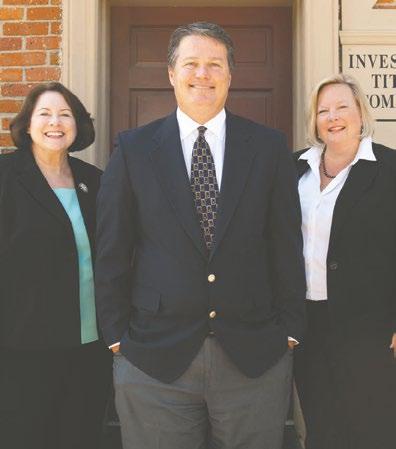
Committed to delivering personalized and accurate service, the commercial team, combined, represents more than 100 years of commercial real estate and underwriting experience.
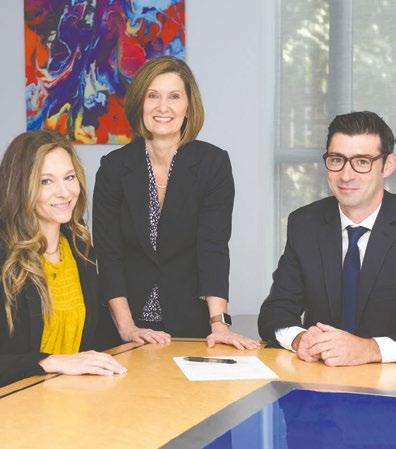
Investors Title commercial specialists serve as the single point of contact through all aspects of the transaction – coordination of title services, underwriting, escrow, disbursements, closing, and post-closing.
COMMERCIAL UNDERWRITING SERVICES






Commercial title insurance and endorsements
Multi-state transactions
Multi-site transactions
Comprehensive services for local and national clients

CONTACT COMMERCIAL UNDERWRITING: commercialservices@invtitle.com | invtitle.com/commercial
CONTACT COMMERCIAL ESCROW: commercialescrow@invtitle.com | invtitle.com/escrow
COMMERCIAL ESCROW SERVICES
Earnest money management Settlement statement preparation Closing disbursement services
1099 reporting services

